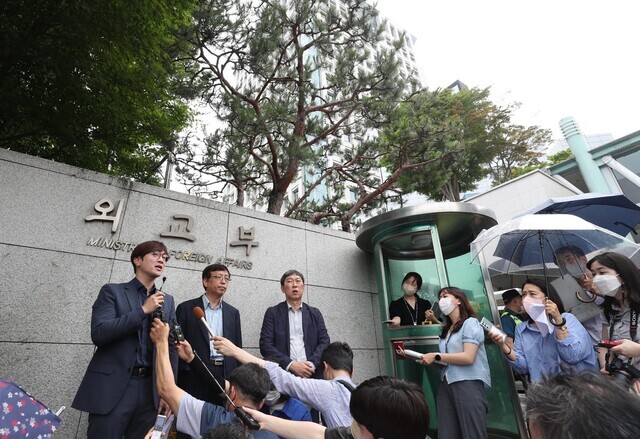hankyoreh
Links to other country sites 다른 나라 사이트 링크
[Editorial] Victims mustn’t be forced to make concessions for sake of Korea-Japan relations

The public-private consultative body formed to find a solution to the problem of compensation for labor conscripts during the Japanese colonial occupation held its first meeting on Monday, marking the launch of its activities. To be sure, it is meaningful that the government, victims, and experts are putting their heads together to solve this important issue after being unable to find an agreeable course of action following the 2018 Korean Supreme Court ruling ordering restitution for victims.
However, the government should bear in mind the concerns that rushing to improve relations between South Korea and Japan will force victims to make concessions.
On Monday, the victims’ representatives officially requested that the Korean government invoke diplomatic protection to allow for direct negotiations with Japan on the matter of compensation.
In 2018, the Supreme Court ruled that Japanese companies must compensate victims of forced labor, but the Japanese government has prevented these companies from carrying out the ruling, arguing that such compensation had been settled for good through the accord signed between the two countries in 1965.
Although the victims' representatives continued to demand negotiations with the companies responsible for using forced labor following the 2018 ruling, they say that “no inkling of communication has come to fruition in the slightest.” The representatives also hinted at the possibility of pushing back the liquidation of assets of war criminal Japanese companies in Korea if such direct negotiations were to become a reality.
Presenting a solution like this is a noteworthy move by the victims, given how Japan threatened that the liquidation of assets would result in the “breakdown” of Korea-Japan relations.
In response to recent reports that the Korean and Japanese governments are in talks on a proposal for compensation via subrogation — whereby the Korean government would pay out compensation to victims initially, then request indemnity from Japan — using 30 billion won (US$23 million) in funds raised by voluntary contributions from companies in both countries, the victims' representatives were concerned about the possibility that the government would force this plan on the victims as a done deal.
Recently, the government has been emphasizing the need to strengthen security cooperation between South Korea, the US and Japan and improve Korea-Japan relations.
On Monday, President Yoon Suk-yeol met with a delegation from the Japan Business Federation, where he reportedly said that the two countries should “pool their strength and wisdom to build a future-oriented cooperative relationship.”
Considering the recent turbulence in the international order, relations with Japan indeed could use improvement and cooperation.
Although the Moon Jae-in administration emphasized its position that the government cannot intervene in the Supreme Court’s rulings regarding the issue of forced labor, the fact that there was no progress in getting an apology or compensation from Japan is largely due to poor diplomacy.
However, the resolution of historical issues between Korea and Japan must be agreed upon by the victims and public opinion as well. In the process, an apology and compensation from the aggressors are bound to be vital components.
The government must face the fact that an agreement that unilaterally grants exoneration will inevitably end in failure, just like the “comfort women” agreement between the South Korean and Japanese governments back in 2015.
Please direct questions or comments to [english@hani.co.kr]

Editorial・opinion
![[Editorial] Penalties for airing allegations against Korea’s first lady endanger free press [Editorial] Penalties for airing allegations against Korea’s first lady endanger free press](https://flexible.img.hani.co.kr/flexible/normal/500/300/imgdb/original/2024/0502/1817146398095106.jpg) [Editorial] Penalties for airing allegations against Korea’s first lady endanger free press
[Editorial] Penalties for airing allegations against Korea’s first lady endanger free press![[Editorial] Yoon must halt procurement of SM-3 interceptor missiles [Editorial] Yoon must halt procurement of SM-3 interceptor missiles](https://flexible.img.hani.co.kr/flexible/normal/500/300/imgdb/child/2024/0501/17145495551605_1717145495195344.jpg) [Editorial] Yoon must halt procurement of SM-3 interceptor missiles
[Editorial] Yoon must halt procurement of SM-3 interceptor missiles- [Guest essay] Maybe Korea’s rapid population decline is an opportunity, not a crisis
- [Column] Can Yoon steer diplomacy with Russia, China back on track?
- [Column] Season 2 of special prosecutor probe may be coming to Korea soon
- [Column] Park Geun-hye déjà vu in Yoon Suk-yeol
- [Editorial] New weight of N. Korea’s nuclear threats makes dialogue all the more urgent
- [Guest essay] The real reason Korea’s new right wants to dub Rhee a founding father
- [Column] ‘Choson’: Is it time we start referring to N. Korea in its own terms?
- [Editorial] Japan’s rewriting of history with Korea has gone too far
Most viewed articles
- 1Bills for Itaewon crush inquiry, special counsel probe into Marine’s death pass National Assembly
- 2[Reporter’s notebook] In Min’s world, she’s the artist — and NewJeans is her art
- 3Months and months of overdue wages are pushing migrant workers in Korea into debt
- 4[Editorial] Penalties for airing allegations against Korea’s first lady endanger free press
- 51 in 3 S. Korean security experts support nuclear armament, CSIS finds
- 6Trump asks why US would defend Korea, hints at hiking Seoul’s defense cost burden
- 7S. Korea discusses participation in defense development with AUKUS alliance
- 860% of young Koreans see no need to have kids after marriage
- 9[Column] Can Yoon steer diplomacy with Russia, China back on track?
- 10At heart of West’s handwringing over Chinese ‘overcapacity,’ a battle to lead key future industries